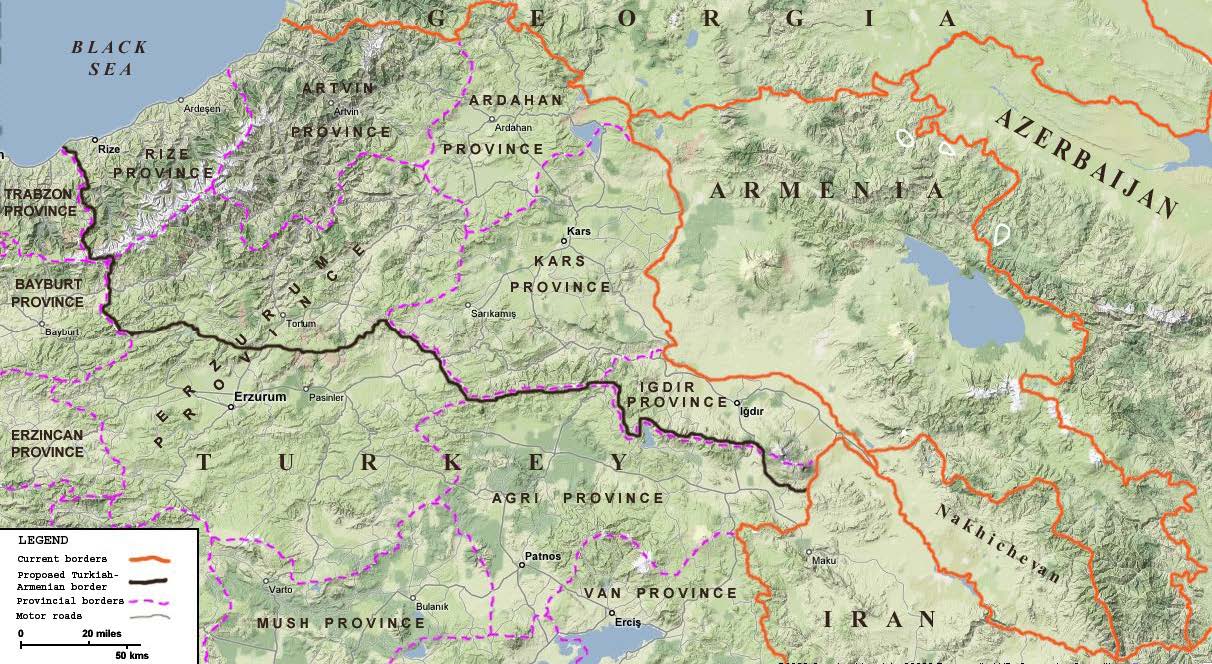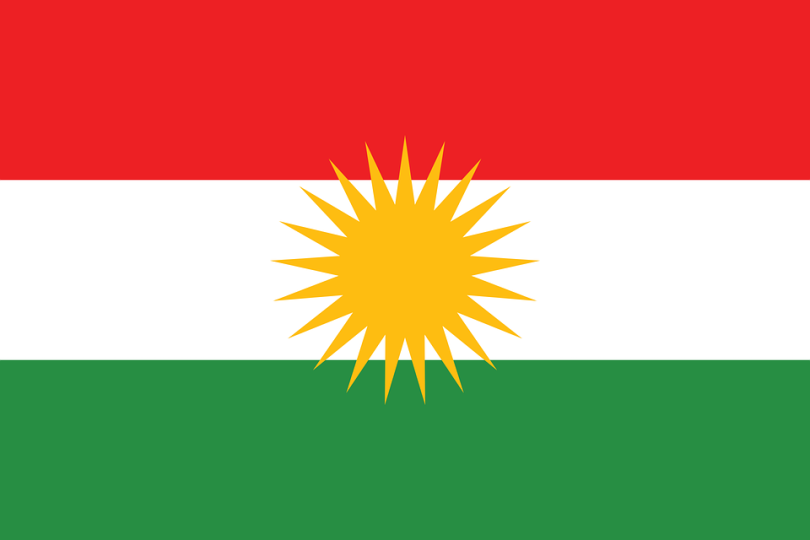David Davidian*, Yerevan, Armenia January 2019
Abstract: The closest entity representing Kurdish sovereignty is the Kurdish Regional Government (KRG) that has ruled Iraqi Kurdistan since 1992. Dozens of countries have diplomatic representation in Erbil, the capital of Iraqi Kurdistan. The KRG has pursued foreign relations autonomously from the central Iraqi government but is constrained in specific actions due to economic ties with Turkey, the dire situation in Syria, international pressure on Iran, and the circumstances of Kurds outside of Iraqi Kurdistan. A resolution to recognize the Turkish genocide of the Armenians was introduced in the Iraqi Kurdistan Parliament in 2015 with various degrees of support from constituent parties, particularly the Patriotic Union of Kurdistan (PUK). The resolution was voted in favor by forty parliament members and submitted for further consideration, where it remained.
Land reparations, as seen on the accompanying map, associated with the full recognition of the Armenian genocide will provide a new trading route from the southeastern Black Sea region south through Armenia into Iran, Iraqi Kurdistan, Iraq, and northeast Syria for products, energy pipelines, etc. This new trading route will alter regional and great power influence in the southern Caucasus, eastern Anatolia, and Mesopotamia.
Background: Relations between Armenians and Kurds have spanned the extremes from close mutual interest to Kurdish tribes actively facilitating the Turkish genocide of the Armenians. The latter vividly passed down through generations and is an established cultural meme, even across geographically separated Kurds. One can estimate the societal depth of this meme whenever oppressive measures have been taken against Kurds in Turkey, Syria, or during Saddam Hussein’s Iraq; direct parallels were made with the planned extermination of the Armenians.
Many Kurdish writers, leaders, and political groups have acknowledged the Kurdish role in the Armenian genocide. In stark contrast, during the genocide, many thousands of Armenians were saved by certain Kurdish groups. Throughout the early decades of Modern Turkey, government forces would target Kurdish groups that may have hidden the remnants of these saved Armenians.
Current KRG policy: Similar to Iran, Iraqi Kurdistan has substantial economic ties with Turkey, in spite of the continued Turkish policy of active assimilation of its Kurdish minority and frequent cross-border raids into Iraq in pursuit of Kurdish Workers Party (PKK) fighters. In retaliation for a pro-Armenian genocide position, Turkey could easily close its hydrocarbon transport facilities to Kurdish oil transport. Also, the current situation in Syria concerning the Kurdish People’s Protection Unit (YPG), which Turkey considers a destabilizing element on its southern border, puts even greater pressure on the KRG not to unilaterally exacerbate relationships between itself, Turkey, and Iraq with any declarations regarding the Armenian genocide.
While the recent president of the KRG, Masoud Barzani, published the memoirs of his father, Mustafa Barzani, which included his accounts of the Turkish genocide of the Armenians, no official statement of recognition has been forthcoming from the KRG. Similarly, the Kurdistan Democratic Party (KDP), led by Masoud Barzani, has not made any officially sanctioned statement on Armenian genocide recognition. Many ranking KDP’s members and various other Kurdish groups have made their own statements. The recent former president of Iraq, Jalal Talabani, founder of the PUK, would often state that Kurds should apologize for their role in the Armenian genocide.
However: Given supportive regional circumstances, it is in the interest of Iraqi Kurdistan to consider full Armenian genocide recognition including land reparations in support of the sovereign expansion of Armenia to the Black Sea, where,
- Armenia furnishes a new north-south trading route from the Black Sea south through Armenia, offering currently unavailable access to the Black Sea for states and entities to the south of This route is also significant given China’s Silk Road initiative.
- The KRG can participate in the restoration and integration of the Kurdish minority on this reparated land.
- The KRG can expand economic and political ties with Armenia, Georgia, Azerbaijan and littoral states on the Black Sea.
- A self-sufficient Armenia can maintain the necessary characteristics that will counter the expansionist nature and land-acquisition characteristics of neighboring states.
- Iraqi Kurdistan can boost its soft-power projection as it deals with other regional issues vital to its interests.
- With enhanced Armenian sovereignty and self-sufficiency, Iraqi Kurdistan will have a non-belligerent allied partner to its north with similar strategic interests.
In summary: From a broad political spectrum representing Kurdish interests, a clear consensus exists for Iraqi Kurdistan’s recognition of the Armenian genocide. Currently, the KRG is limited in its ability to project much of any political power given the current regional chaos in its midst. However, the KRG should weigh the benefits of full recognition of the Armenian genocide including land reparations, as regional conditions dictate, including a catalytic genocide recognition by Turkey. A stronger Armenia counterbalances aggressive expansionism in its immediate region and provides a new north-south route to the Black Sea states, extending into Europe, serving: Armenia, Georgia, Iran, Iraqi Kurdistan, Iraq, Azerbaijan, and northwest Syria.
* David Davidian is a US-born citizen residing in Armenia. He is an Adjunct Lecturer at the American University of Armenia.


